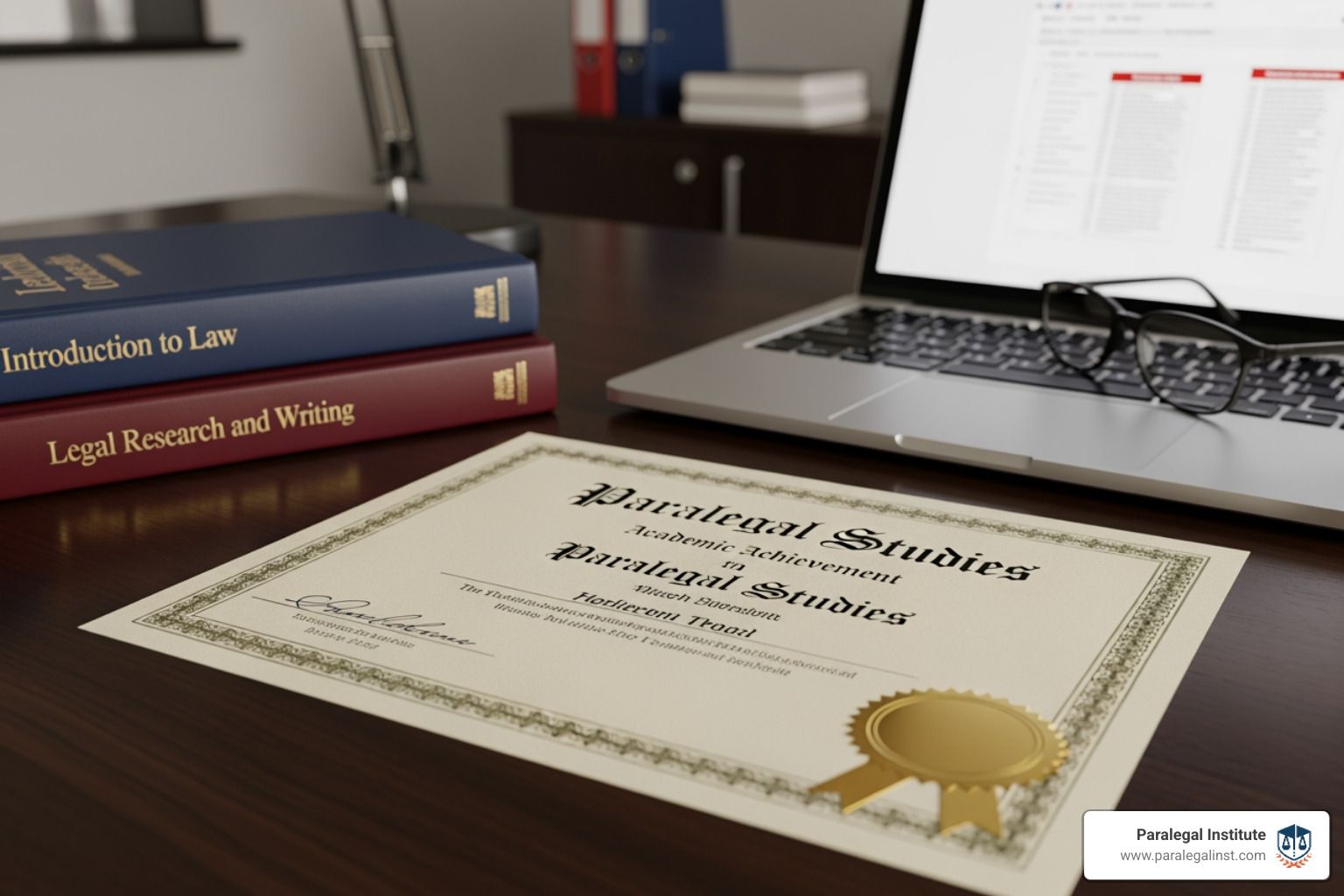Beyond the Brief: Unpacking AI's Impact on the Future of Law
The Legal Landscape Transformed: An Introduction to AI
The AI in legal field is fundamentally changing how legal professionals work by automating repetitive tasks, enhancing legal research, and improving decision-making. This shift promises increased efficiency and better quality work, while also introducing critical ethical and practical challenges.
Core impacts include:
- Improved Efficiency: Automates routine tasks like document review and legal research, saving significant time.
- Improved Accuracy: AI can analyze vast datasets with precision, reducing human error.
- Strategic Focus: Frees legal professionals to concentrate on complex analytical and client-facing work.
- Ethical Considerations: Raises new questions about data privacy, bias, and the responsible use of AI tools.
The AI in legal field is buzzing with activity. Artificial intelligence (AI), especially Generative AI (GenAI), is rapidly changing how law firms operate. It's no longer a futuristic concept; nearly three-quarters of lawyers plan to use GenAI in their work.
This guide will unpack this change, exploring the benefits AI offers, like saving time and improving work quality. We'll also dive into the significant challenges, risks, and ethical issues that come with using AI in legal practice. Finally, we'll look at current trends and what the future holds.
I'm Matthew Pfau. My passion for client advocacy, honed through jury trials and running a law firm, now drives me to train future legal professionals in the evolving AI in legal field.
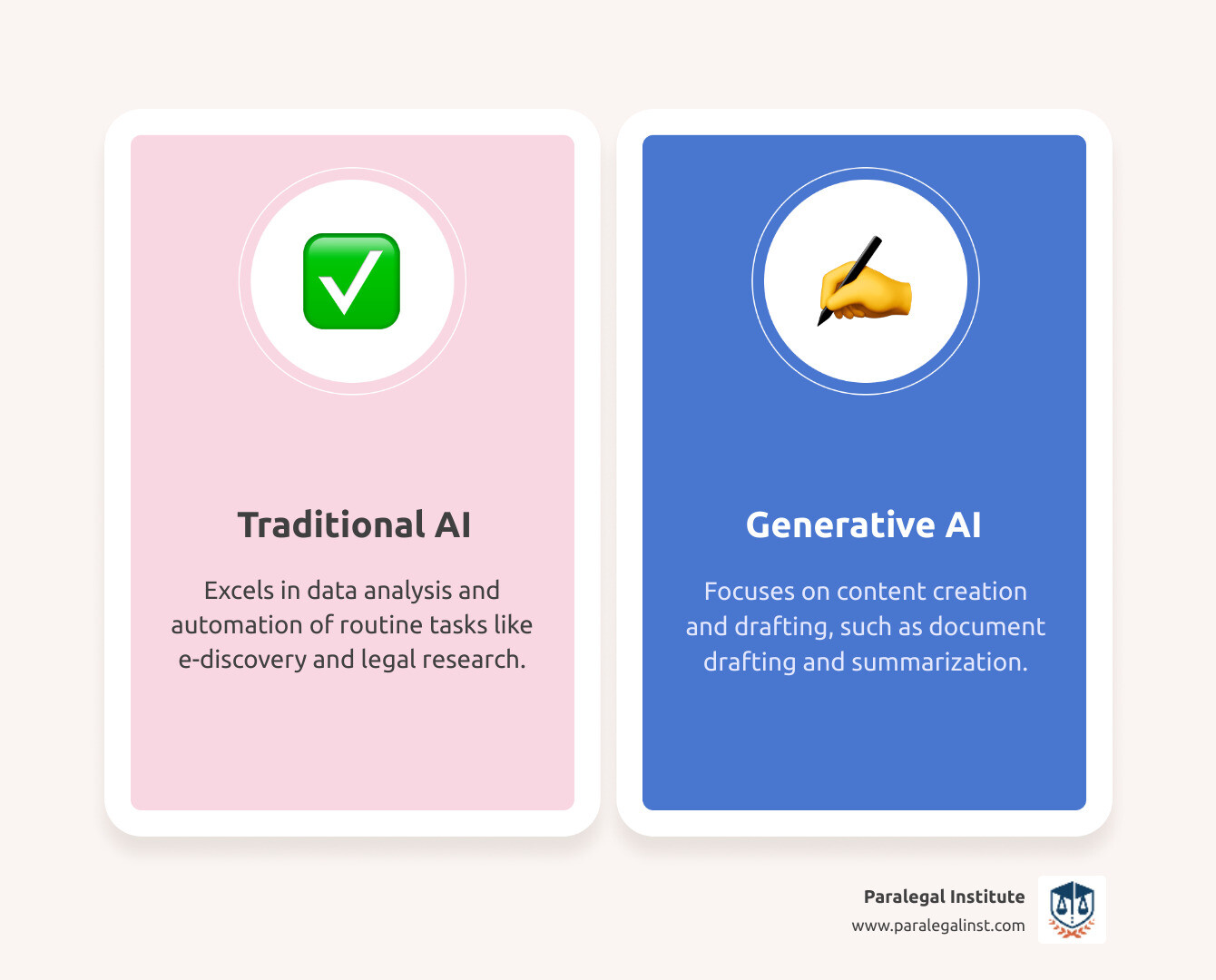
The AI Revolution in Legal Practice: Applications and Benefits
At its core, Artificial Intelligence refers to computer systems that learn as they go, mimicking human cognitive activity. Under the AI umbrella, we find specialized technologies like Machine Learning (ML), where systems learn from data, and Natural Language Processing (NLP), which enables computers to understand and generate human language.
Then there's Generative AI (GenAI), which has captured everyone's imagination. Unlike traditional AI that analyzes existing data, GenAI can create entirely new content, such as text, images, or code. It learns patterns from vast datasets, often using Large Language Models (LLMs) to power its linguistic capabilities. For the AI in legal field, this represents a huge leap in what technology can do.
These technologies are changing legal data analysis, moving us beyond sifting through mountains of information. AI can quickly complete data-intensive tasks, leading to significant productivity gains and allowing legal professionals to focus on more strategic work.
Key Applications of AI in the Legal Field
The applications of AI in the legal world are already making a tangible difference. Here are some of the top ways AI is being used today:
- Legal Research: AI-powered tools like Westlaw Edge and Lexis+ AI can sift through massive volumes of case law, statutes, and precedents in seconds. They can summarize key aspects of cases, helping us find relevant information faster and more comprehensively.
- Document Review: Technology-assisted review (TAR) uses AI to review documents for relevant information. AI can identify patterns and flag anomalies in large data volumes, making discovery far more efficient and accurate. This predictive coding helps assess risk earlier in a case.
- Contract Analysis: AI can review agreements to identify missing or inconsistent terms, summarize key clauses, and ensure compliance with legal standards. This is invaluable for due diligence, where AI can process various data sources to retrieve pertinent documentation.
- Drafting Legal Documents: Generative AI is changing how we approach drafting. It can produce first drafts of legal briefs, demand letters, and contracts. Proprietary GenAI solutions like Ballard Spahr's "Ask Ellis" are used for drafting and secure data handling, reducing time spent on initial drafts.
- Predictive Analytics: AI tools like Gavelytics can analyze historical case data to predict potential outcomes, assess case value, and anticipate a judge's tendencies. This helps develop more effective litigation strategies.
- Virtual Assistants and Chatbots: AI-powered chatbots are increasingly used to provide basic legal information, gather initial client information, and help individuals steer court processes for minor claims.
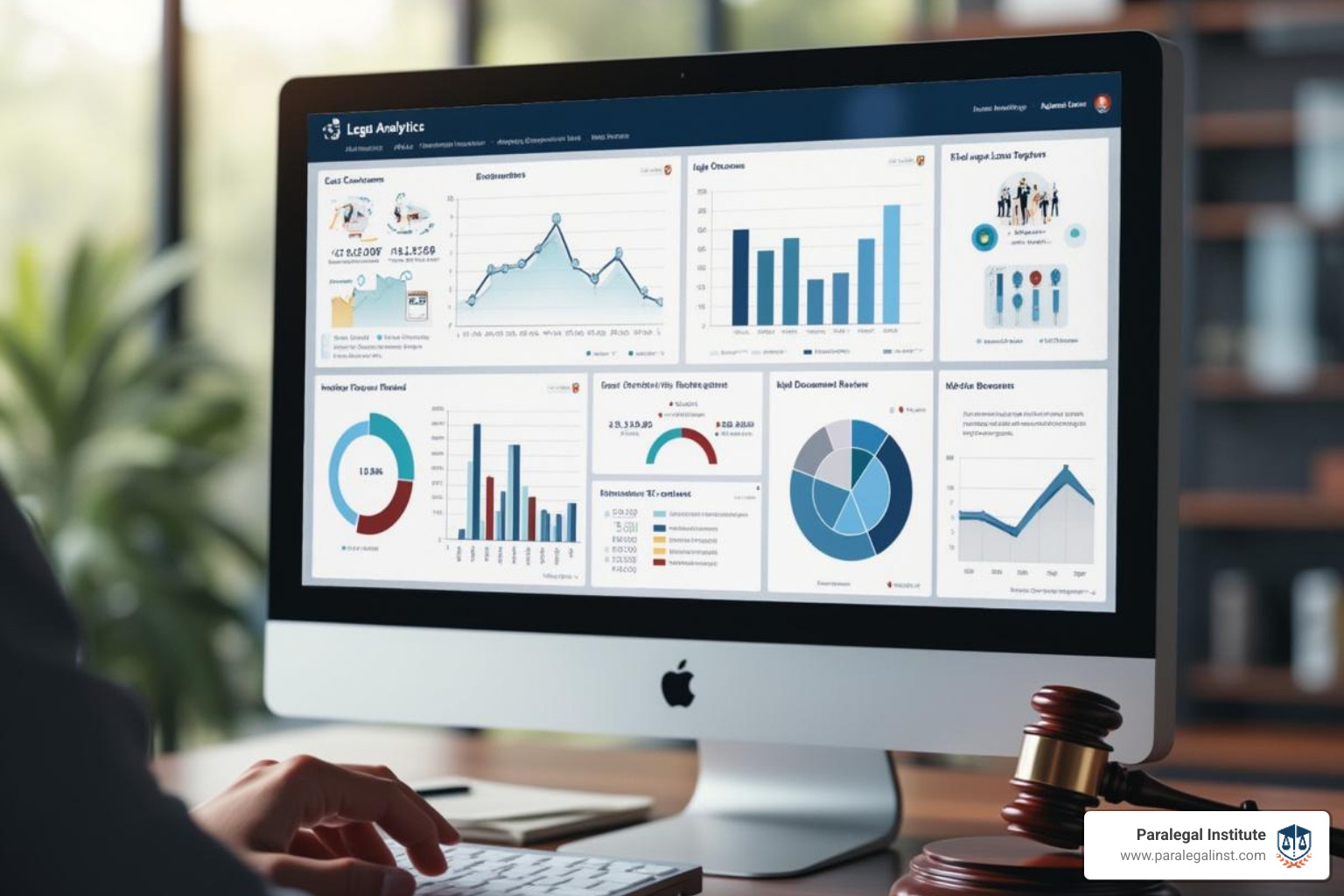
The Tangible Benefits for Law Firms and Clients
The integration of AI brings profound, tangible benefits to law firms and their clients.
- Time Savings: This is the most immediate benefit. AI automates time-consuming tasks, freeing up legal professionals. For instance, a complaint response system reduced associate time from 16 hours to just 3-4 minutes. Lawyers have seen productivity gains greater than 100 times using AI tools.
- Cost Reduction: By automating tasks and increasing efficiency, AI helps law firms and legal departments reduce operational costs. This can lead to more competitive pricing for clients.
- Improved Quality & Accuracy: AI's ability to analyze vast datasets with precision reduces human error. Whether catching inconsistencies in contracts or ensuring comprehensive research, AI contributes to higher-quality work. 90% of firms believe AI benefits both the firm and the client through improved service quality.
- Improved Client Relations: With AI handling routine tasks, legal professionals can focus more on personalized client services, strategic analysis, and building stronger relationships.
- Reduced Attorney Stress: The monotony of tasks like extensive document review can be significantly alleviated by AI. By taking on these repetitive burdens, AI frees up attorneys' time and mental energy for the "higher-level work" and "creative, intellectual analysis" that computers cannot replicate, reducing stress and frustration.
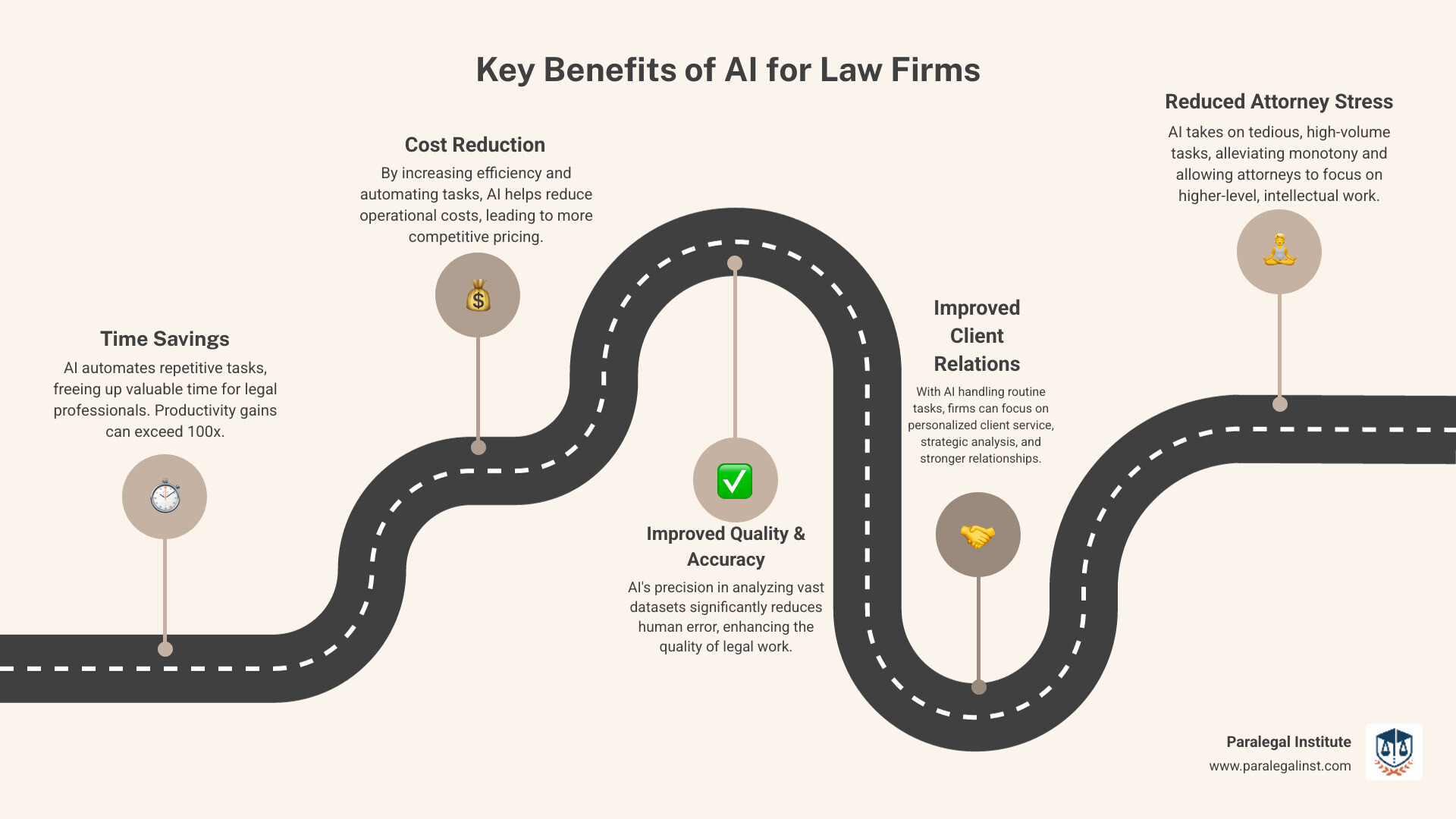
Navigating the Risks and Ethical Minefield of AI
While AI offers incredible advantages, it's crucial to understand its risks to use it wisely and ethically. For the AI in legal field, we face serious questions about data privacy, fairness, and how it might change our jobs.
The Hallucination Problem: When AI Gets the Law Wrong
In AI, a "hallucination" occurs when the model confidently presents false information, invents facts, or even creates non-existent legal cases. This is not a rare glitch. Studies show general chatbots can "hallucinate" on legal questions 58% to 82% of the time. Even specialized legal AI tools aren't perfect; some have been found to provide incorrect information in over 17% of cases, with one tool hallucinating over 34% of the time.
We've already seen real-world consequences. A New York attorney used ChatGPT to draft a brief that cited fictional cases. In another instance, a federal judge fined lawyers for filing court documents with AI-generated fake citations.
These examples highlight a crucial lesson: AI is a powerful assistant, but it cannot replace professional judgment or the need for thorough verification. Always double-check AI-generated content.
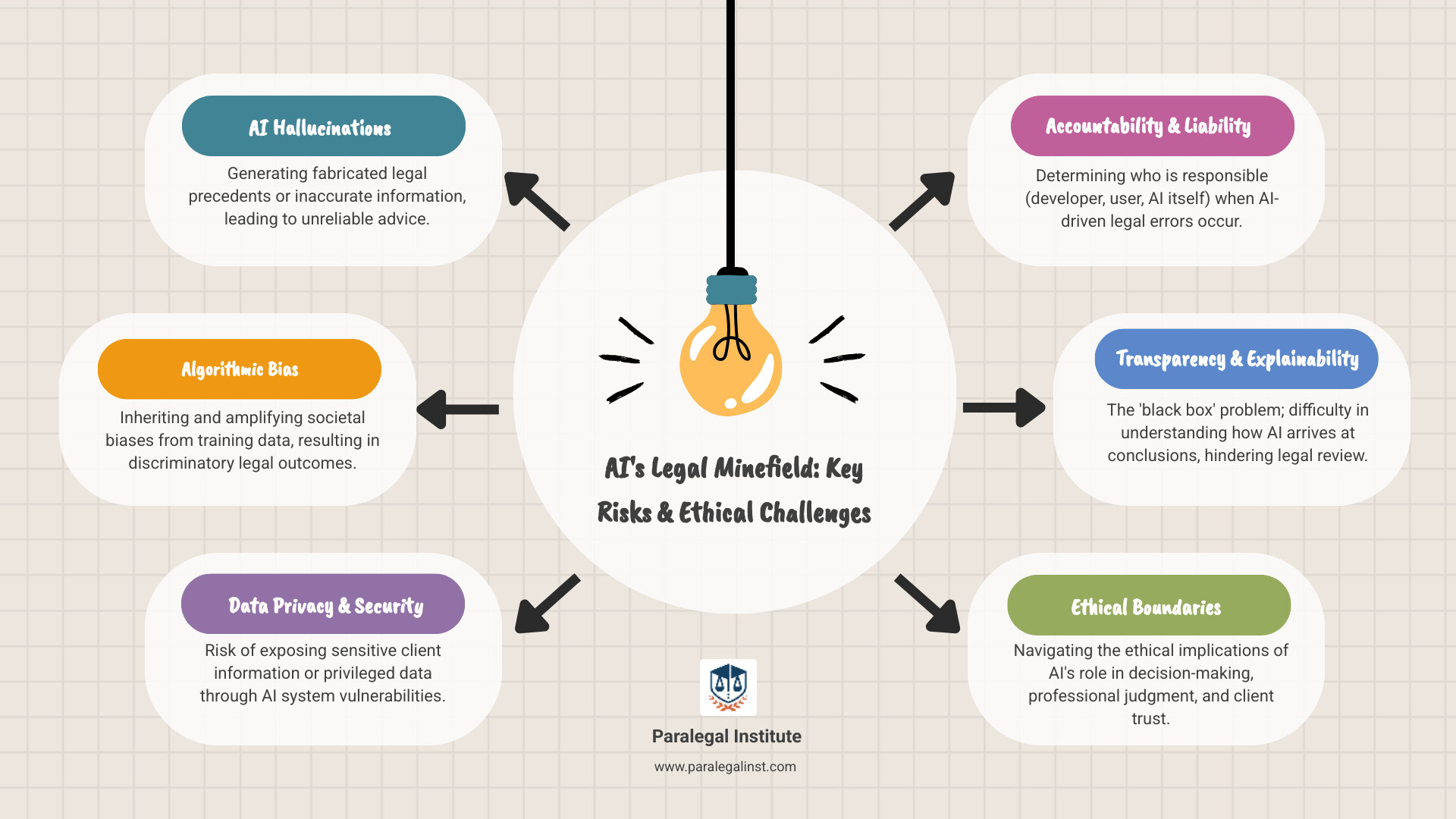
Ethical Duties and Professional Responsibilities in the AI Era
Our core ethical duties as legal professionals remain paramount. The Model Rules of Professional Conduct provide clear guidelines for using AI responsibly.
First is our Duty of Competence(Rule 1.1). We must understand the tools we use. If you use AI for research or drafting, you are ultimately responsible for the accuracy and quality of the work. Human oversight is essential to verify everything AI produces.
Next is the Duty of Confidentiality(Rule 1.6). Protecting client secrets is sacred. When using AI tools, especially cloud-based ones, you must be diligent about security to ensure client information remains safe.
Then there's the Duty of Supervision. If AI handles parts of your work, you must maintain close oversight. This means having a "human in the loop" to review all AI-generated documents for accuracy and appropriateness.
Finally, Disclosure to Clients and Courts is increasingly important. Be transparent about using generative AI, especially when client data is involved. As of May 2024, over 25 federal judges have issued orders requiring attorneys to disclose or monitor their AI use. Always check your firm's policies and the judge's specific instructions.
The American Bar Association (ABA) passed Resolution 604 in 2023, stressing that AI use must be accountable, transparent, and trackable. This calls for guidelines to ensure human accountability for AI tools and organizational responsibility for any resulting issues.
Unpacking Bias, Privacy, and Job Displacement Concerns
Beyond hallucinations and ethical duties, there are broader societal concerns.
First, Algorithmic Bias. AI learns from the data it's fed. If that data contains historical biases, the AI can perpetuate or even amplify them. For example, some tools used in bail or sentencing decisions have been criticized for potential racial bias. We must be vigilant to ensure AI doesn't lead to unfair outcomes.
Then there are Data Security Risks and Client Confidentiality. Using cloud-based AI tools introduces new security challenges, as highlighted by a ChatGPT data breach in March 2023. Law firms must ensure their AI tools adhere to strict data protection protocols to maintain client trust.
Finally, the question of Job Displacement. Will AI replace lawyers? A survey found that 72% of legal professionals "strongly disagree." AI cannot replicate the complex analysis, client relationships, or leadership that lawyers provide. However, AI will change tasks, especially for entry-level roles like information gathering and document review. This means the roles of legal professionals, including paralegals, will evolve. Rather than being replaced, paralegals may find themselves overseeing AI-produced content, creating new opportunities for those who accept AI literacy.
For even more insights into how AI is making its way into the legal world, explore our page on AI Adoption in the legal field.
Reshaping the Business of Law: AI's Impact on Firm Operations
AI is not just changing legal work; it's reshaping the business models and operational strategies of law firms. From the billable hour to team staffing, AI is a catalyst for significant change.
The Billable Hour Under Pressure
The billable hour, estimated to be at least 80 percent of fee arrangements in large law firms, faces a challenge from AI-driven efficiency. If AI can reduce a 16-hour task to 3 minutes, how do we bill for it?
Many believe AI will shift the focus of billable work. An AmLaw100 firm suggested an "80/20 inversion," where attorneys spend less time on information gathering and more on high-value strategic analysis. This shift encourages firms to develop alternative pricing, such as fixed-fee or value-based billing, reflecting AI's efficiency gains.
Evolving Staffing Models and the Future of Legal Teams
Despite job displacement concerns, many large law firms don't expect to reduce attorney headcount due to AI. Instead, they anticipate adding new roles like data scientists and AI engineers. As one firm noted, "Even with our AI initiatives, we just brought in the largest associate class in the history of the firm."
The industry is adapting its structures. Half of law firms have established an internal team dedicated to understanding AI, and about a third (29%) have a practice group focused on AI law for clients.
AI can also strengthen the apprenticeship model in a remote work environment. By automating routine tasks, AI helps train young associates more consistently, allowing senior attorneys to focus on mentoring higher-level skills. Legal teams will evolve, requiring new skills in AI oversight and data analysis, ensuring human expertise remains at the core of legal practice.

The Future is Now: Trends and Best Practices for AI in the Legal Field
The adoption of AI in the legal field is a major shift, not a passing trend. To succeed, legal professionals must understand current dynamics and how to use AI wisely.
Current Trends Driving the Adoption of AI in the Legal Field
Several factors are accelerating AI adoption. Increased client expectations for faster, higher-quality service are pushing firms to innovate. Competitive pressure gives an advantage to firms that use AI to cut costs and improve service, making it a necessity to keep pace with global peers.
Technology is also more accessible. Cloud computing allows firms of all sizes to use advanced legal tools without major infrastructure investment. Finally, the rise of specialized legal AI tools like Harvey AI, CoCounsel, Lexis+ AI, and Westlaw Precision makes it easier for firms to adopt AI that fits their specific needs. To learn more about how widespread AI in legal field is becoming, check out our dedicated page on AI in the legal field.
The Future of Legal Education and AI Literacy
As AI in legal field evolves, so does legal education. Law schools are integrating AI into their curricula, asking students to use AI tools and then fact-check the results. Many are adding courses on AI ethics, legal tech, and data privacy. For example, Berkeley Law offers a course on Generative AI for the Legal Profession.
Continuing Legal Education (CLE) is also adapting, as it becomes clear that AI literacy is essential for lawyers and paralegals to remain effective.
At The Paralegal Institute, we emphasize practical skills for immediate employment. Our hands-on classes, designed by practicing legal professionals, are constantly updated to meet modern legal world demands. This includes incorporating AI skills and knowledge into our paralegal certificate programs. We believe AI proficiency is becoming a fundamental skill for everyone in the legal profession.
Best Practices for Responsible AI Implementation
Implementing AI requires a thoughtful strategy. Here are some best practices for using AI responsibly and effectively:
- Start with a pilot program. Test AI in a single, controlled area to gauge its effectiveness and fit within your firm.
- Prioritize security and data privacy. Implement strong cybersecurity measures and ensure any AI tools comply with data protection regulations. Client confidentiality is paramount.
- Invest in comprehensive user training. Proper training ensures that technology is used effectively, safely, and ethically.
- Develop clear governance policies. Establish firm-wide rules for AI use, including guidelines for fact-checking, client disclosure, and data handling.
- Emphasize human oversight ("human in the loop"). AI is a tool, not a replacement for professional judgment. Always have a human review AI-generated work to check for accuracy and potential hallucinations.
- Build a business case. Focus on how AI can solve significant problems or deliver a strong return on investment, highlighting benefits like time savings and improved service.
Conclusion
The AI in legal field has reached a turning point. This technology is not just changing how we work; it's reshaping the practice of law for the 21st century.
We've seen how AI and Generative AI are revolutionizing legal work. The benefits are undeniable: massive time savings, significant cost reductions, and improved quality that better serves our clients. However, AI is not a magic wand. The risks—from AI hallucinations and algorithmic bias to data privacy concerns—are serious.
This is why our ethical duties of competence, confidentiality, and supervision are more critical than ever. A "human in the loop" approach is essential, where technology amplifies our skills but never replaces our professional judgment.
The business of law is also evolving. The billable hour is under pressure, pushing us toward more value-based client relationships. The fear of job loss appears unfounded; 72% of legal professionals believe AI won't replace lawyers, and firms are creating new roles to manage these technologies.
Looking ahead, the trends of rising client expectations and sophisticated AI tools will continue. Legal education is adapting to prepare professionals for this new reality.
At The Paralegal Institute, we have always focused on preparing you for the real world. Our hands-on curriculum, designed by practicing legal professionals, evolves with the profession. We don't just teach you about AI; we show you how to work alongside it responsibly and effectively.
The future of law is a partnership between human insight and artificial intelligence. AI in legal field represents an incredible opportunity for those ready to accept it thoughtfully and ethically.
To gain the skills needed to thrive in this evolving legal landscape, explore our Advanced AI for Paralegals course. The future is here.








